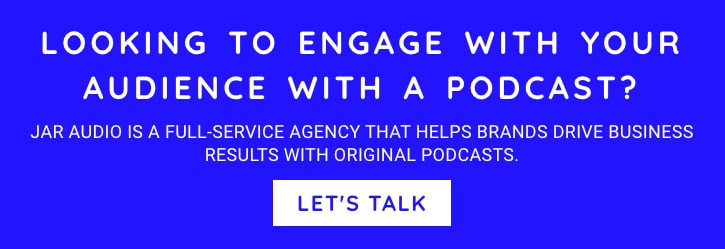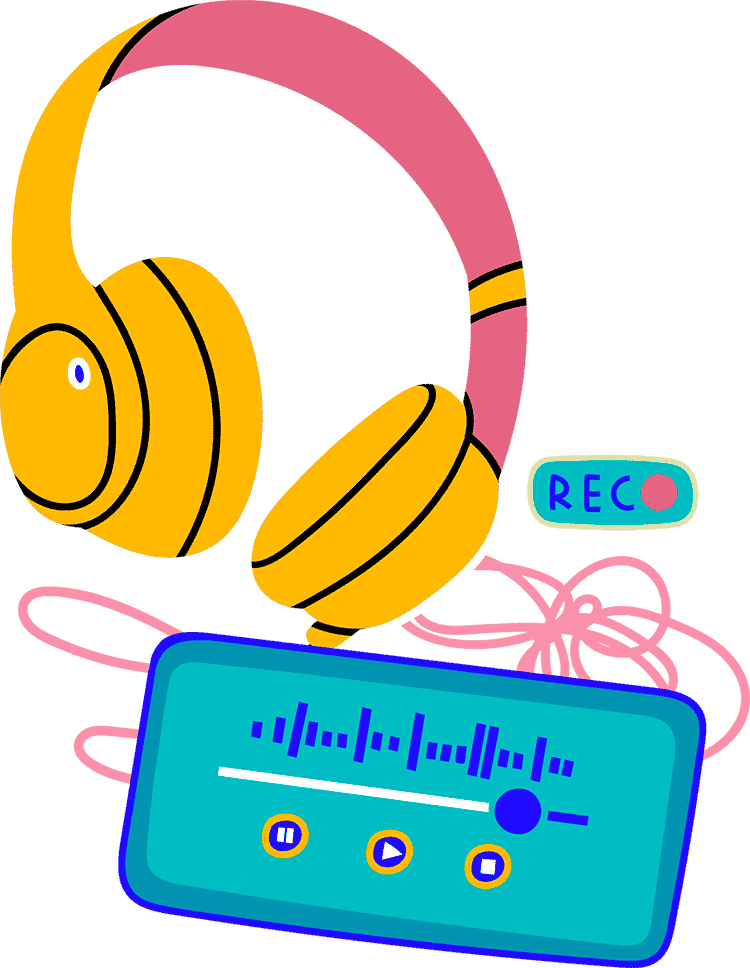When people hear I’m the Chief Creative Officer at JAR, they assume I started out in podcasting.
I didn’t.
I cut my teeth in theatre before moving into live radio — first at the CBC, then at Roundhouse Radio. Acting taught me how to command an audience. Producing taught me how to serve one. Most days, I was happily behind the scenes. But when the unexpected happened — an absent host, a last-minute emergency — I’d find myself suddenly in the hosting chair, with no editing safety net.
Everything went out live. Every stumble, every awkward silence, every unplanned cough, every question I hadn’t properly prepared. So believe me when I say: hosting is tough.
And as a radio and podcast producer (a.k.a. cat herder), I’ve worked with every type of host you can imagine:
- Wing-It Wallys who refused to prep.
- Nitpick Nancys who re-wrote every line until it was lifeless.
- Seasoned Pros who made it look easy — because they worked like hell.
That’s why I’m here to tell you: Hosting a podcast is a skill that takes practice. There are a LOT of factors to consider, especially for a branded podcast.
Later in my career, when I moved into podcasting, I figured I had it made. That’s because in podcasting, there’s a common myth:
“It’s not live. It’s just chatting. Hosting should be easy.”
Wrong.
Hosting a podcast – especially a branded podcast – takes prep, craft, vulnerability, and a deep respect for the audience.
At JAR, I’ve trained dozens of first-time hosts — and even seasoned execs — who learned this the hard way.
Below are real, anonymized confessions I’ve heard from hosts over the years. If you’ve ever tried hosting, you’ll relate. And if you’re thinking about hosting your own show? Treat these as lessons you don’t have to learn the hard way.
“I had no idea how hard it is to sound unscripted.”
— Host of a branded banking podcast
One of my favourites.
Everyone wants to sound natural. But reading scripted intros or ad reads without sounding robotic is a skill, like any other.
It’s about “lifting” words off the page so they sound like you. It takes breath control, phrasing, energy.
Lesson: A good producer helps you rehearse, adjust your script to your voice, and coach you to sound like yourself. To get better at this skill, practice reading your script in front of the mirror. Do vocal warm-up exercises to physically loosen up your voice and stretch your mouth. I like opera singer David Gordon’s vocal warmups for sheer tongue-twisting challenge. Eg: “She stood upon the balcony, inimically mimicking him hiccupping while amicicably welcoming him in.” Try saying that five times fast!
“It took me three episodes to stop talking like I was on a webinar.”
— Industry insider with his own show
Some corporate hosts think they need to present all the time. They slip into jargon and buzzwords, or read slides aloud.
Your audience doesn’t want a webinar — they want a conversation.
Lesson: A producer helps you drop the corporate speak and talk like a human being. They also know how to “write for the ear, not for the page” – adjusting diction so it feels natural. To get better at this – try breaking up your script into shorter sentences.
Remember: People simply don’t speak in jargon, or in multi-hyphenate conjoined phrases.
“I finally understood the difference between brand voice and my voice when I had to lift it off the page.”
— CMO hosting their company’s flagship podcast
This is where podcast host training shines.
Yes, you want the show to match your brand’s voice. But it still has to be your voice, too. You can’t be an AI reading your brand guidelines aloud. Well, technically, you CAN, but this will not connect with an audience.
Good hosting blends the two:
- Brand-aligned messaging.
- Personal authenticity.
Lesson: Work with a producer who understands your brand but knows how to make you sound like you. To get better at this skill, try introducing short anecdotes from your own life occasionally. Admit mistakes. Acknowledge that you don’t know everything. Lift the veil of anonymity just a little bit – so the audience can get to know you better.
“I find it so hard to read and look at the camera at the same time.”
— Co-host of a locally made arts podcast
This one’s incredibly relatable, especially for anyone moving from purely audio to video podcasts. Reading a script (or even just bullet notes) while maintaining genuine eye contact with the camera is surprisingly hard. Your audience needs to feel like you’re talking to them, not reading at them.
It’s a skill that combines:
- Teleprompter technique.
- Natural pacing.
- Comfortable, relaxed delivery.
It also requires planning and practice to get right:
- Keeping your notes tight and in your own voice.
- Learning where and when to glance without losing the thread.
- Building confidence so you can ad-lib naturally when needed.
Lesson: This is where good podcast production shines.
- A producer can help you rewrite clunky sections to be easier to read aloud.
- They can guide you in rehearsing until you feel natural.
- They can even coach you on body language and camera presence—so you’re not just delivering words, but connecting with your audience.
If you’re struggling with this? You’re not alone. It’s one of the most common hurdles for new hosts — and one of the easiest to solve with a little support and practice. In addition, newer AI gaze control software can correct spots where your eyes are looking in the wrong direction – but use this solution sparingly, as it can create an eerily unnatural look if overused.
“It’s a lot of pressure to try and represent our entire company culture.”
— Young first-time host for a big brand
Hosting a branded podcast is personal. You’re not just asking questions — you’re embodying your company in someone’s ears.
You’re their guide.
Their advocate.
Their human face.
And you have to do it while:
- Making your guest comfortable.
- Making eye contact with the camera.
- Reading off a teleprompter.
- Following a question line without sounding stiff.
- Listening actively to pick up conversational “breadcrumbs” your guest drops.
- Asking smart follow-ups on the fly.
- Reacting naturally, while keeping the audience in mind.
It’s a lot.
A good producer doesn’t just hit “record.” They help lighten that load by:
- Guest chasing and prep.
- Writing Q-lines and identifying topic focus areas.
- Running backchannel support (suggesting follow-ups live, ensuring you are within brand parameters).
- Coaching your delivery and listening skills.
- Editing the final cut so you sound as smart and lively as you actually are – with fewer stumbles and restarts.
The “Silent guest at the dinner table”
One of my favourite metaphors.
Your audience is the silent guest at your table. Even if they don’t say much, you still have to pass them the potatoes.
- Talk directly to them.
- React for them.
- Explain when things get too inside-baseball.
- Invite them into the story.
- Thank them for listening.
This approach works well in both audio and video podcasting. It’s a critical engagement tactic that far too many shows overlook. You have to acknowledge the audience because podcasting is intimate. You’re literally inside someone’s head. The audience is right there with you 100% of the time in a 1-1 relationship, but unlike live radio, there’s usually no live call-in line to remind you of that fact.
Authenticity > Perfection
Here’s the big one.
People don’t want a perfect host. They want a real one.
Someone who messes up occasionally.
Who laughs at their own jokes.
Who shares a bit of themselves so listeners can see they’re human.
That matters even more in branded podcasting.
Because the best brands know: Trust is built on authenticity.
Hosting a branded podcast is a skill. And that’s good news.
If you’re reading this and feeling nervous? Good.
It means you’re taking it seriously.
Hosting a branded podcast isn’t easy. But it is learnable.
With the right production partner, you don’t have to figure it out alone.
At JAR, we don’t just hit record.
- We help you find your voice.
- Coach you through delivery.
- Prep your guests.
- Suggest follow-ups live if you want them.
- And edit your schlomozzle of an interview into a sleek, flowing, engaging story.
As a longtime podcast producer and host (still on my own learning curve), I can tell you in no uncertain terms: Podcast hosting is a craft. And if you’re willing to practice it, you can become truly great.
Thinking about hosting your own branded show?
Let’s see if we’re the right partner to help you do it right.

Jen Moss is the Co-Founder and and Chief Creative Officer of JAR Audio. As JAR’s podcast “doula”, collaborating with enterprise brands to bring great podcasts into the world. With a background spanning CBC Radio, Canada’s National Film Board Digital Studio, Vancouver’s Roundhouse Radio and the University of British Columbia, she guides the creation of captivating podcasts at JAR.



